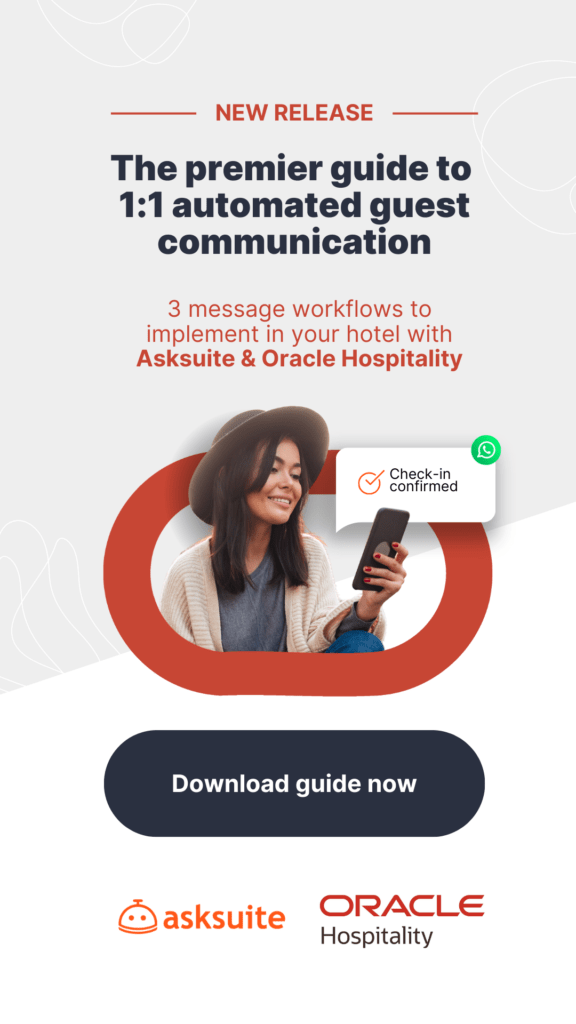Talking about how to build a hotel sales team can be complex. We know there are no infallible rules or models.
Still, when forming a sales team in the hospitality industry, we deal with fundamental principles and values understood by all people and which can improve results.
If you’re scratching your head trying to plan ahead, you’ve come to the right place. In this article, we highlight the essential points to creating a sales team in the hospitality industry, emphasizing high performance.
These tips will expand your repertoire of hotel management indicators, and help you get the most out of your team, always focusing on results. Dive in!
1. Start with reservations
The first important factor is to start looking at reservations as one of the main sales channels for your hotel.
It is a strategic division of your business because it brings you important information about your guests and their needs, which helps you improve your processes. And indeed, traveler habits are also changing.
In addition, The number of walk-in guests (customers who arrive at the reception desk without a reservation) is ballooning.
We’re sure the number of calls, emails, WhatsApp messages, and chats on your website has increased considerably. Look at your numbers, and you’ll surely see that this is happening at your hotel.
But is this good or bad for hotels?
Unfortunately, tourism was one of the sectors most impacted by Covid-19. As a result, transformations are still taking place, requiring multidisciplinary and dynamic professional profiles when forming the hotel sales team.
Don’t look at it as good or bad, it’s a change, and hoteliers must understand where hotel reservations are coming from, and where the traveler made the first contact.
2. Know your market and steer your team well
Another essential topic is to know which are the biggest markets for your hotel. This is important to define the focus and strength of your sales team and to bring in the desired results, in the short and long terms.
This is key to expanding your direct bookings and keeping your guests. It can also drastically reduce the commission paid to intermediaries.
It’s always crucial to make the most out of every opportunity to interact with your audience using online and offline channels.
Despite the great technological advances, the telephone is still an important communication and sales channel for the hotel industry.
After all, amid so many forms of contact on the internet, a customer calling the hotel shows a high purchase intention. To give you an idea:
- A Google research shows that 61% of mobile device users call companies when they are in the purchase phase during the consumer journey.
- According to this same study, most people call because they want a quicker response (59%).
Remember, it still happens greatly due to the lack of information on the hotels’ websites. All details about your hotel need to be easy to find and clear for the traveler to complete the purchase.
So, there are a few options left: either the traveler calls your hotel, or opens an OTA website. It should be shocking that more information about hotels is available on these other channels than on the hotel’s website.
3. Update your website
The article The Ultimate Guide to Hotel Direct Bookings talks about the importance of having an intuitive website. In addition, it must have great usability and alluring images.
Great websites allow you to outline clear online strategies, automate processes, and facilitate direct communication with the traveler. With an optimized website, you are one step closer to competing at the same level as OTAs.
To exemplify, the travel sector has the highest cart abandonment rate. That is, more than 80% of tourism website visitors leave booking pages without making a purchase.
And so, the hotel market could be losing up to 10 billion dollars a year due to reservation abandonment.
Investing time in this matter, and making your website your storefront, should be at the top of priorities.
Put yourself in your customer’s shoes and go through the experience of booking at your own hotel, either online or offline. You can also use companies that provide hidden shoppers, which can help improve this process and your customer’s buying journey.
Recommended: 7 Killer Hotel Website Designs to Get Inspired
4. Keep an eye on online and offline sales processes
It is clear that recurring dropout patterns might be related to the inefficiency of the purchasing process. After all, who likes long, complicated booking steps with incomplete information and tools that don’t work? In such cases, the chances of customers giving up on the purchase are very high.
But dropouts aren’t exclusive to online bookings. Call centers also face the same difficulty. If a traveler calls the hotel, but the call center isn’t effective and satisfactory, they can give up on the reservation.
How to reduce the abandonment rate and loss of sales online and offline?
For online bookings, invest heavily on an excellent website. As mentioned, it must look nice, intuitive, user-friendly, and display innovative technology.

Implementing omnichannel management in the distribution and sales of your hotel, such as the one Asksuite provides, is also high-level.
On the other hand, it’s essential that your hotel develops a transparent service policy and has reservations as the foundation of this policy.
5. Train your hospitality sales team whenever possible
Training hotel sales staff is essential to achieve great things in the hotel industry. It ensures all employees know the product they are selling in-depth and are allocated according to their skills.
The staff must be well aware of the differences between the types of rooms and the services provided by the hotel. This knowledge will result in the best possible service to customers, ensuring satisfaction and loyalty.
It is also crucial that your team knows the competition and understands the strengths, weaknesses, opportunities, and threats, doing a thorough SWOT analysis.
The reservations team must always provide straightforward answers that are easily understood by the public. If a traveler contacts your reservations team, they’ve probably done a lot of online research and don’t want generic tips.
Train your hotel reservations team to always be more active in customer interactions. When customers show signs of indecision, agents need to guide them toward closing. Here, it is important to remember to give your team autonomy and define parameters that can help them negotiate with the potential guest.
Hotel Cast #22 brings you Žana Usher, CEO & Founder of Žana Divine Hospitality, who shares insightful tips about the guest experience, service, and the importance of valuing and applying continuous teaching for the hotel staff. Get your headphones ready!
6. Always be ready
Prepare your team to handle top customer objections. In some cases, travelers are resistant, and giving your team a list of some pertinent objections can reduce the conversion time.
You can gather, for example, the main guest complaints. Here, questions related to the stay, reservation process, check-in, and check-out cases come into play.
Top guest compliments and recommendations for your property and anything related to feedback can also be listed.
With this, your team will be able to create arguments to overcome objections during the service, indicating differentials that enhance the establishment and the location, increasing reservations.

7. Watch your online reputation
The service policy developed must be uncomplicated. It should help the team answer questions and objections as quickly as possible, as well as anticipate key customer queries.
These guidelines affect your online reputation directly, so have a designated person to manage your hotel’s reputation—that includes all comments and complaints that guests post on sites such as TripAdvisor, Google, and OTAs themselves.
It turns out that many hotels suffer from flaws in the booking process, simply because they don’t analyze customer complaints that indicate these errors.
That said, developing a habit in your team to read comments and offer solutions for them is another way to achieve your goals.
Sometimes, these comments bring essential information to improve your processes. They can, for example, help organize your hotel services and shouldn’t be considered just as a rank.
What is good and bad in working with Sales commission in the hotel industry? What are the best practices? Jutta Moore has the answer.
Watch the full podcast below:
Building a hotel sales team
Understand that, when making a purchase decision, customers want as much information as possible to ensure they are making the best choice. Any doubt can postpone the booking.
Therefore, an excellent booking process listens to the needs and helps the customer get all the necessary information for a confident decision.
“Treat people as they would like to be treated”. In this way, you’ll be looking at the genuine needs of each person and, therefore, the chances of retaining that guest increase exponentially.
And don’t forget to follow Asksuite on LinkedIn for our latest updates and news. Click on the button:
About the author: Vagner Sardinha has a degree in Business Administration with specializations in marketing, people management, and revenue management. With more than 28 years of experience in sales (19 of them in hotels and tourism) and working in large operators, Vagner Sardinha has a macro and strategic view of the entire distribution chain. In addition to his solid experience in managing and building multidisciplinary teams, he is also a professor of Strategic Sales.




